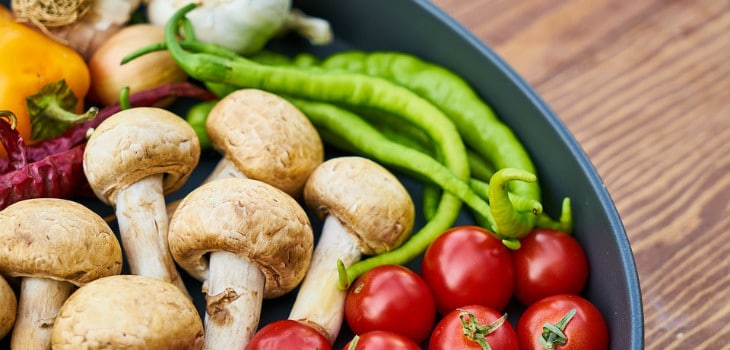Plant Powered: Welcome to Veganism 2.0
Have you noticed veganism has changed? No longer seen as something more radical than vegetarianism, welcome to veganism 2.0, where in 2017 felt more inclusive, with shops, restaurants and food producers all moving to offer more mainstream vegan options.
And Australia is helping to lead the pack, with the Sydney Morning Herald noting our country is the third fastest growing vegan market in the world. According to Euromonitor International, Australia’s vegan packaged food industry is worth $136 million. The market researcher believes by 2020 it will hit $215 million.
One of those brands who has noticed the change towards a more mainstream acceptance of eating no dairy, meat, fish, eggs or anything else derived from animals, is Pukka Herbs— a Naturally Good exhibitor and multi-million dollar company recently bought by Unilever.
“Where veganism used to be considered extreme and extraordinary, and was entirely founded in objecting to cruelty, now a large number of the more recent vegan converts seem to be making the choice for health reasons as well,” says Natasha Lewis, Managing Director of Organic Trader, who represents Pukka Herbs in Australia.
“The stigma around the extremeness of the choice seems to have almost completely diminished, bringing it and the related products slowly but surely into the mainstream.”
And the numbers back her up. In the UK, veganism has risen by 350 percent in the last decade. In Australia, it’s increased from 1.7 to 2.1 million in the last four years. Additional to this is the rise in flexitarians—those who have adopted a more plant-based lifestyle, often for health and environmental reasons. Usually, these individuals may not be able to completely give up eggs, seafood or even meat.
As well becoming a lot more inclusive as a movement, the food industry is responding more quickly to consumer demands to eat more plants and less animal-based products. According to the Vegan Society in the UK, restaurants and cafes have seen a 51 percent increase in consumers asking for vegan options over the last few years*.
From coconut milk yoghurts by COYO to protein and plant-based healthy snacks at Bounce (who make nut and seed based energy balls), the on-the-go food sector is where a lot of this vegan-friendly change can be seen. More vegan products alongside mainstream ones on the shelves of supermarkets and convenience stores means people are able to stick to a vegan diet without having to hunt high and low for special products.
Organic and raw bars brand Paleo Pure, believe that brands are getting better at not only catering to a vegan consumer base but also at making consumers aware that they are a vegan brand.
“I think there are more brands on the market, but there are also more food manufacturers that are more aware of what vegan is, and then making the fact that their product is vegan friendly readily identifiable on the packaging,” says Emma Risvanis, Managing Director, Paleo Pure.
But it’s not just in the health food sector that we’re seeing an adoption of more vegan-orientated products. Ben and Jerry’s, for example, now does a vegan range. Nut, rice and coconut milks have exploded in demand, with many of Australia’s cult cafes serving non-dairy milks as standard with dairy milk on request. Vegan skincare is also a booming sector, which dovetails with more consumers wanting to know the ingredients in their wellness or skincare routine are all natural rather than chemical based.
“From tea to nail polish, it is an important USP touted frequently across both food and non-food products,” says Lewis.
So what is fuelling the rise in veganism?
Veganism has become something of a badge of honour rather than something to be whispered at dinner tables. This is partly because of the younger generation who are more aware of the health and environmental benefits of a ‘plant-powered’ lifestyle through social media influencers and cookery books.
The term ‘plant-powered’ itself has been used over a million times on Instagram and many millennials will refer to this moniker, rather than being vegan. It can also cover flexitarians and vegetarians, meaning it’s a more easily adopted term for some.
The rise in rejecting meat, fish, dairy and animal products is also partly fuelled by a rise in global awareness around controversial meat and dairy factories. With 21 billion chickens on Earth (three for every human) and land the size of Europe needed to feed industrially farmed animals across the world, it’s not surprising the more educated consumer is looking at their dietary choices and seeing it as way of taking environmental action.
A rise in awareness of the effect food has on our bodies and cult documentaries like Cowspiracy, have galvanised a new wave of socially active diners. It’s not just about eating less processed junk for better health, but also for the wellbeing of the planet. Eating more plants (whether you’re fully vegan or a flexitarian) is doubly attractive in this case—it’s health-conscious and conscious of the world’s resources.
Veganism is becoming easier to adopt too—with vegan milk in every cafe and vegan-friendly snacks in almost every supermarket. Ultimately, this means more opportunities for food brands to target an informed and active consumer base who want to eat well, live well and treat the planet well.
Reference:
*The research for The Vegan Society was carried out online by Opinion Matters between 17 and 23 October 2017 amongst a panel resulting in 2,000 UK adult respondents. All research conducted adheres to the MRS Codes of Conduct (2010) in the UK and ICC/ESOMAR World Research Guidelines. Opinion Matters is registered with the Information Commissioner’s Office and is fully compliant with the Data Protection Act (1998).
-
Get your FREE ticket
- REGISTER FOR FREE
